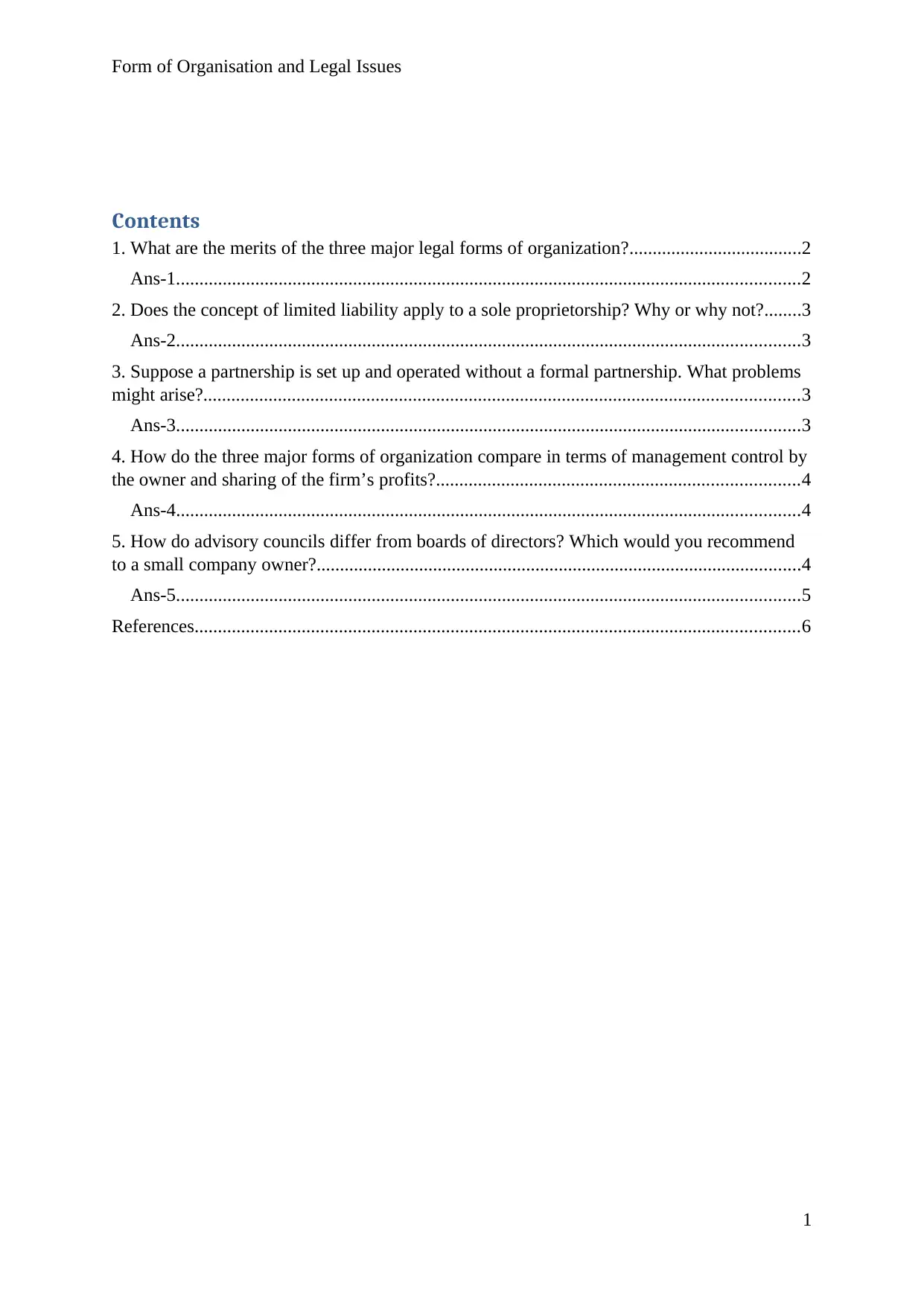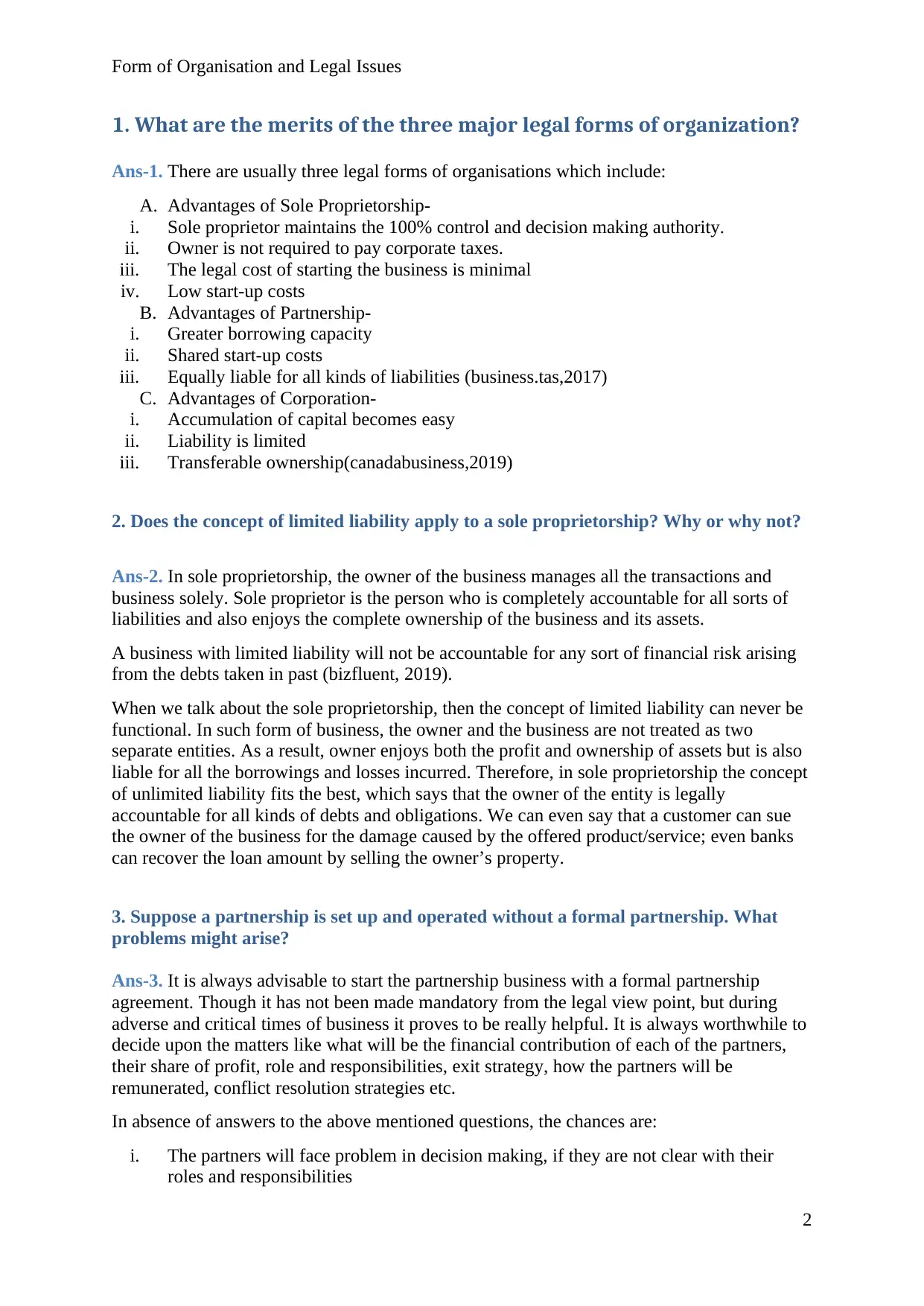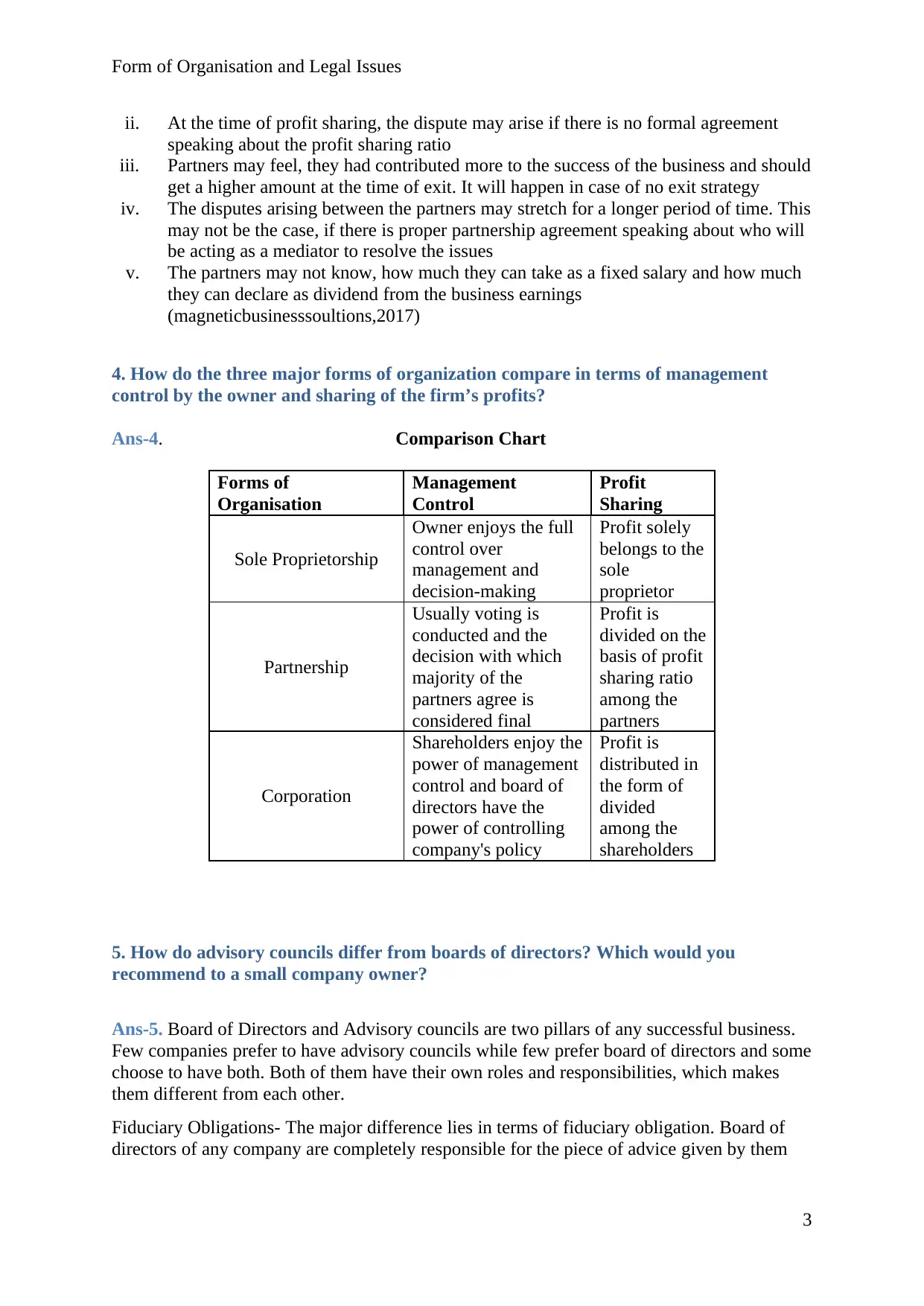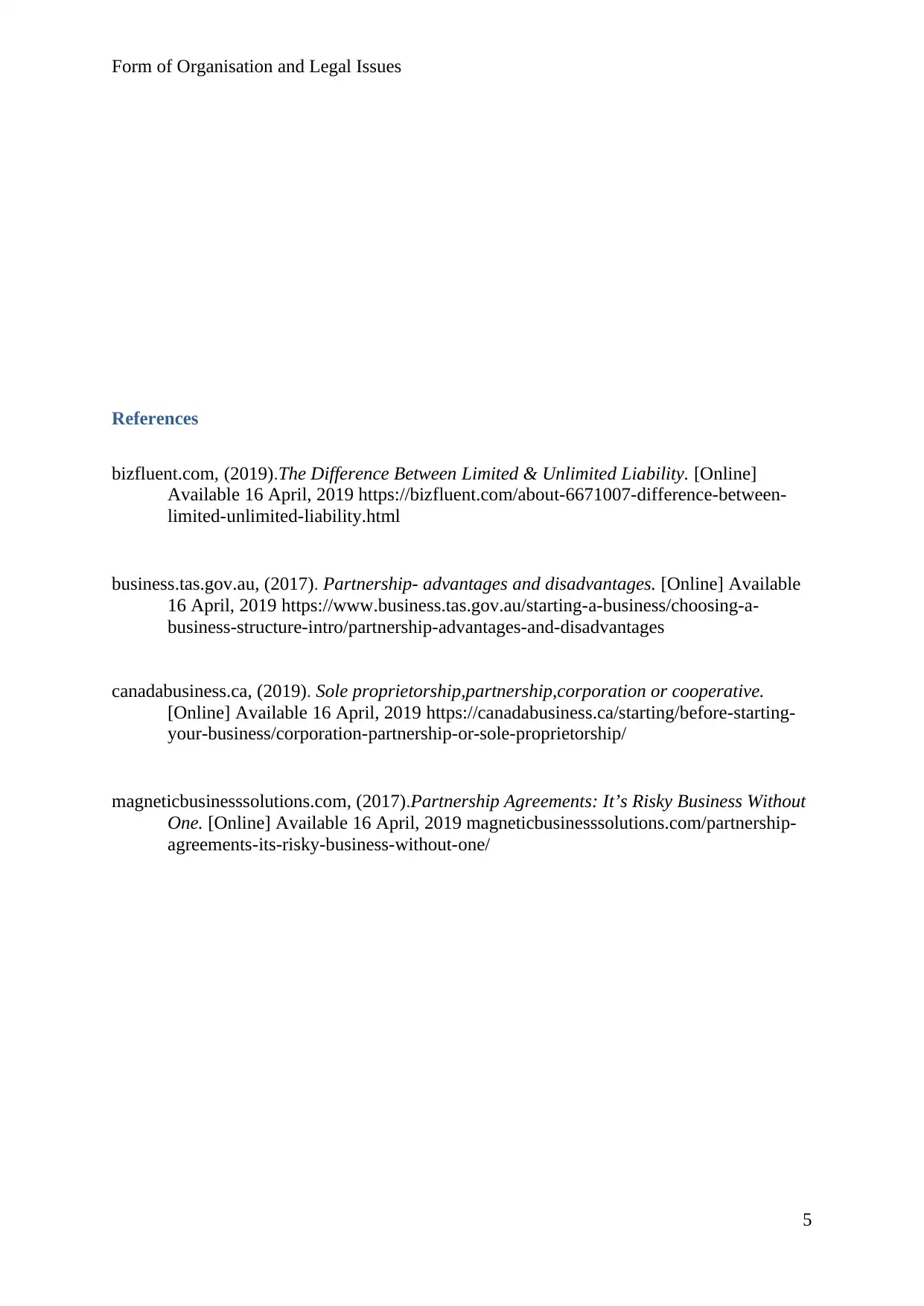Humber College - Chapter 10: Forms of Organization and Legal Issues
VerifiedAdded on 2023/04/21
|6
|1355
|113
Homework Assignment
AI Summary
This assignment addresses key questions regarding the legal forms of organization for small businesses. It begins by outlining the merits of sole proprietorships, partnerships, and corporations, including their advantages such as ease of setup and limited liability, and disadvantages such as unlimited liability and complex structures. The assignment then clarifies that limited liability does not apply to sole proprietorships, where the owner is personally liable for all business debts. It explores the potential problems of operating a partnership without a formal agreement, such as disputes over profit sharing and decision-making. A comparison chart details management control and profit-sharing structures across the three main forms of organization. Finally, the assignment differentiates between advisory councils and boards of directors, recommending advisory councils for small company owners due to lower costs and focused advice.

Running Head: Form of Organisation and Legal Issues
Form of Organisation and Legal Issues
Form of Organisation and Legal Issues
Paraphrase This Document
Need a fresh take? Get an instant paraphrase of this document with our AI Paraphraser

Form of Organisation and Legal Issues
Contents
1. What are the merits of the three major legal forms of organization?.....................................2
Ans-1......................................................................................................................................2
2. Does the concept of limited liability apply to a sole proprietorship? Why or why not?........3
Ans-2......................................................................................................................................3
3. Suppose a partnership is set up and operated without a formal partnership. What problems
might arise?................................................................................................................................3
Ans-3......................................................................................................................................3
4. How do the three major forms of organization compare in terms of management control by
the owner and sharing of the firm’s profits?..............................................................................4
Ans-4......................................................................................................................................4
5. How do advisory councils differ from boards of directors? Which would you recommend
to a small company owner?........................................................................................................4
Ans-5......................................................................................................................................5
References..................................................................................................................................6
1
Contents
1. What are the merits of the three major legal forms of organization?.....................................2
Ans-1......................................................................................................................................2
2. Does the concept of limited liability apply to a sole proprietorship? Why or why not?........3
Ans-2......................................................................................................................................3
3. Suppose a partnership is set up and operated without a formal partnership. What problems
might arise?................................................................................................................................3
Ans-3......................................................................................................................................3
4. How do the three major forms of organization compare in terms of management control by
the owner and sharing of the firm’s profits?..............................................................................4
Ans-4......................................................................................................................................4
5. How do advisory councils differ from boards of directors? Which would you recommend
to a small company owner?........................................................................................................4
Ans-5......................................................................................................................................5
References..................................................................................................................................6
1

Form of Organisation and Legal Issues
1. What are the merits of the three major legal forms of organization?
Ans-1. There are usually three legal forms of organisations which include:
A. Advantages of Sole Proprietorship-
i. Sole proprietor maintains the 100% control and decision making authority.
ii. Owner is not required to pay corporate taxes.
iii. The legal cost of starting the business is minimal
iv. Low start-up costs
B. Advantages of Partnership-
i. Greater borrowing capacity
ii. Shared start-up costs
iii. Equally liable for all kinds of liabilities (business.tas,2017)
C. Advantages of Corporation-
i. Accumulation of capital becomes easy
ii. Liability is limited
iii. Transferable ownership(canadabusiness,2019)
2. Does the concept of limited liability apply to a sole proprietorship? Why or why not?
Ans-2. In sole proprietorship, the owner of the business manages all the transactions and
business solely. Sole proprietor is the person who is completely accountable for all sorts of
liabilities and also enjoys the complete ownership of the business and its assets.
A business with limited liability will not be accountable for any sort of financial risk arising
from the debts taken in past (bizfluent, 2019).
When we talk about the sole proprietorship, then the concept of limited liability can never be
functional. In such form of business, the owner and the business are not treated as two
separate entities. As a result, owner enjoys both the profit and ownership of assets but is also
liable for all the borrowings and losses incurred. Therefore, in sole proprietorship the concept
of unlimited liability fits the best, which says that the owner of the entity is legally
accountable for all kinds of debts and obligations. We can even say that a customer can sue
the owner of the business for the damage caused by the offered product/service; even banks
can recover the loan amount by selling the owner’s property.
3. Suppose a partnership is set up and operated without a formal partnership. What
problems might arise?
Ans-3. It is always advisable to start the partnership business with a formal partnership
agreement. Though it has not been made mandatory from the legal view point, but during
adverse and critical times of business it proves to be really helpful. It is always worthwhile to
decide upon the matters like what will be the financial contribution of each of the partners,
their share of profit, role and responsibilities, exit strategy, how the partners will be
remunerated, conflict resolution strategies etc.
In absence of answers to the above mentioned questions, the chances are:
i. The partners will face problem in decision making, if they are not clear with their
roles and responsibilities
2
1. What are the merits of the three major legal forms of organization?
Ans-1. There are usually three legal forms of organisations which include:
A. Advantages of Sole Proprietorship-
i. Sole proprietor maintains the 100% control and decision making authority.
ii. Owner is not required to pay corporate taxes.
iii. The legal cost of starting the business is minimal
iv. Low start-up costs
B. Advantages of Partnership-
i. Greater borrowing capacity
ii. Shared start-up costs
iii. Equally liable for all kinds of liabilities (business.tas,2017)
C. Advantages of Corporation-
i. Accumulation of capital becomes easy
ii. Liability is limited
iii. Transferable ownership(canadabusiness,2019)
2. Does the concept of limited liability apply to a sole proprietorship? Why or why not?
Ans-2. In sole proprietorship, the owner of the business manages all the transactions and
business solely. Sole proprietor is the person who is completely accountable for all sorts of
liabilities and also enjoys the complete ownership of the business and its assets.
A business with limited liability will not be accountable for any sort of financial risk arising
from the debts taken in past (bizfluent, 2019).
When we talk about the sole proprietorship, then the concept of limited liability can never be
functional. In such form of business, the owner and the business are not treated as two
separate entities. As a result, owner enjoys both the profit and ownership of assets but is also
liable for all the borrowings and losses incurred. Therefore, in sole proprietorship the concept
of unlimited liability fits the best, which says that the owner of the entity is legally
accountable for all kinds of debts and obligations. We can even say that a customer can sue
the owner of the business for the damage caused by the offered product/service; even banks
can recover the loan amount by selling the owner’s property.
3. Suppose a partnership is set up and operated without a formal partnership. What
problems might arise?
Ans-3. It is always advisable to start the partnership business with a formal partnership
agreement. Though it has not been made mandatory from the legal view point, but during
adverse and critical times of business it proves to be really helpful. It is always worthwhile to
decide upon the matters like what will be the financial contribution of each of the partners,
their share of profit, role and responsibilities, exit strategy, how the partners will be
remunerated, conflict resolution strategies etc.
In absence of answers to the above mentioned questions, the chances are:
i. The partners will face problem in decision making, if they are not clear with their
roles and responsibilities
2
⊘ This is a preview!⊘
Do you want full access?
Subscribe today to unlock all pages.

Trusted by 1+ million students worldwide

Form of Organisation and Legal Issues
ii. At the time of profit sharing, the dispute may arise if there is no formal agreement
speaking about the profit sharing ratio
iii. Partners may feel, they had contributed more to the success of the business and should
get a higher amount at the time of exit. It will happen in case of no exit strategy
iv. The disputes arising between the partners may stretch for a longer period of time. This
may not be the case, if there is proper partnership agreement speaking about who will
be acting as a mediator to resolve the issues
v. The partners may not know, how much they can take as a fixed salary and how much
they can declare as dividend from the business earnings
(magneticbusinesssoultions,2017)
4. How do the three major forms of organization compare in terms of management
control by the owner and sharing of the firm’s profits?
Ans-4. Comparison Chart
Forms of
Organisation
Management
Control
Profit
Sharing
Sole Proprietorship
Owner enjoys the full
control over
management and
decision-making
Profit solely
belongs to the
sole
proprietor
Partnership
Usually voting is
conducted and the
decision with which
majority of the
partners agree is
considered final
Profit is
divided on the
basis of profit
sharing ratio
among the
partners
Corporation
Shareholders enjoy the
power of management
control and board of
directors have the
power of controlling
company's policy
Profit is
distributed in
the form of
divided
among the
shareholders
5. How do advisory councils differ from boards of directors? Which would you
recommend to a small company owner?
Ans-5. Board of Directors and Advisory councils are two pillars of any successful business.
Few companies prefer to have advisory councils while few prefer board of directors and some
choose to have both. Both of them have their own roles and responsibilities, which makes
them different from each other.
Fiduciary Obligations- The major difference lies in terms of fiduciary obligation. Board of
directors of any company are completely responsible for the piece of advice given by them
3
ii. At the time of profit sharing, the dispute may arise if there is no formal agreement
speaking about the profit sharing ratio
iii. Partners may feel, they had contributed more to the success of the business and should
get a higher amount at the time of exit. It will happen in case of no exit strategy
iv. The disputes arising between the partners may stretch for a longer period of time. This
may not be the case, if there is proper partnership agreement speaking about who will
be acting as a mediator to resolve the issues
v. The partners may not know, how much they can take as a fixed salary and how much
they can declare as dividend from the business earnings
(magneticbusinesssoultions,2017)
4. How do the three major forms of organization compare in terms of management
control by the owner and sharing of the firm’s profits?
Ans-4. Comparison Chart
Forms of
Organisation
Management
Control
Profit
Sharing
Sole Proprietorship
Owner enjoys the full
control over
management and
decision-making
Profit solely
belongs to the
sole
proprietor
Partnership
Usually voting is
conducted and the
decision with which
majority of the
partners agree is
considered final
Profit is
divided on the
basis of profit
sharing ratio
among the
partners
Corporation
Shareholders enjoy the
power of management
control and board of
directors have the
power of controlling
company's policy
Profit is
distributed in
the form of
divided
among the
shareholders
5. How do advisory councils differ from boards of directors? Which would you
recommend to a small company owner?
Ans-5. Board of Directors and Advisory councils are two pillars of any successful business.
Few companies prefer to have advisory councils while few prefer board of directors and some
choose to have both. Both of them have their own roles and responsibilities, which makes
them different from each other.
Fiduciary Obligations- The major difference lies in terms of fiduciary obligation. Board of
directors of any company are completely responsible for the piece of advice given by them
3
Paraphrase This Document
Need a fresh take? Get an instant paraphrase of this document with our AI Paraphraser

Form of Organisation and Legal Issues
and even are financially liable for any bad piece of suggestion. Whereas, advisory council is
not liable for their any poor piece of advice.
Right to vote- The power to vote at the time of major decision making, lies only in the hands
of board of directors but the advisory councils do not enjoy this voting right. However, board
of directors can take advice from their advisory council before making any decision.
Involved cost- The cost involved in the formation and management of the Board of directors
is on a higher side if we compare it with the same costs involved in the formation of advisory
council. The expenses like travel expenses, attendance fees etc. of the board of directors are
borne by the organisation, but in case of advisory council it is taken care by the council itself.
For a small company owner, it would be better if he opt for advisory council over the board
of directors. In case of small business, it is important to reduce cost in order to increase the
profit margin, so if they choose board of directors for decision making purpose they will have
to bear the costs of their travelling, meeting, remuneration etc.
4
and even are financially liable for any bad piece of suggestion. Whereas, advisory council is
not liable for their any poor piece of advice.
Right to vote- The power to vote at the time of major decision making, lies only in the hands
of board of directors but the advisory councils do not enjoy this voting right. However, board
of directors can take advice from their advisory council before making any decision.
Involved cost- The cost involved in the formation and management of the Board of directors
is on a higher side if we compare it with the same costs involved in the formation of advisory
council. The expenses like travel expenses, attendance fees etc. of the board of directors are
borne by the organisation, but in case of advisory council it is taken care by the council itself.
For a small company owner, it would be better if he opt for advisory council over the board
of directors. In case of small business, it is important to reduce cost in order to increase the
profit margin, so if they choose board of directors for decision making purpose they will have
to bear the costs of their travelling, meeting, remuneration etc.
4

Form of Organisation and Legal Issues
References
bizfluent.com, (2019).The Difference Between Limited & Unlimited Liability. [Online]
Available 16 April, 2019 https://bizfluent.com/about-6671007-difference-between-
limited-unlimited-liability.html
business.tas.gov.au, (2017). Partnership- advantages and disadvantages. [Online] Available
16 April, 2019 https://www.business.tas.gov.au/starting-a-business/choosing-a-
business-structure-intro/partnership-advantages-and-disadvantages
canadabusiness.ca, (2019). Sole proprietorship,partnership,corporation or cooperative.
[Online] Available 16 April, 2019 https://canadabusiness.ca/starting/before-starting-
your-business/corporation-partnership-or-sole-proprietorship/
magneticbusinesssolutions.com, (2017).Partnership Agreements: It’s Risky Business Without
One. [Online] Available 16 April, 2019 magneticbusinesssolutions.com/partnership-
agreements-its-risky-business-without-one/
5
References
bizfluent.com, (2019).The Difference Between Limited & Unlimited Liability. [Online]
Available 16 April, 2019 https://bizfluent.com/about-6671007-difference-between-
limited-unlimited-liability.html
business.tas.gov.au, (2017). Partnership- advantages and disadvantages. [Online] Available
16 April, 2019 https://www.business.tas.gov.au/starting-a-business/choosing-a-
business-structure-intro/partnership-advantages-and-disadvantages
canadabusiness.ca, (2019). Sole proprietorship,partnership,corporation or cooperative.
[Online] Available 16 April, 2019 https://canadabusiness.ca/starting/before-starting-
your-business/corporation-partnership-or-sole-proprietorship/
magneticbusinesssolutions.com, (2017).Partnership Agreements: It’s Risky Business Without
One. [Online] Available 16 April, 2019 magneticbusinesssolutions.com/partnership-
agreements-its-risky-business-without-one/
5
⊘ This is a preview!⊘
Do you want full access?
Subscribe today to unlock all pages.

Trusted by 1+ million students worldwide
1 out of 6
Related Documents
Your All-in-One AI-Powered Toolkit for Academic Success.
+13062052269
info@desklib.com
Available 24*7 on WhatsApp / Email
![[object Object]](/_next/static/media/star-bottom.7253800d.svg)
Unlock your academic potential
Copyright © 2020–2026 A2Z Services. All Rights Reserved. Developed and managed by ZUCOL.




